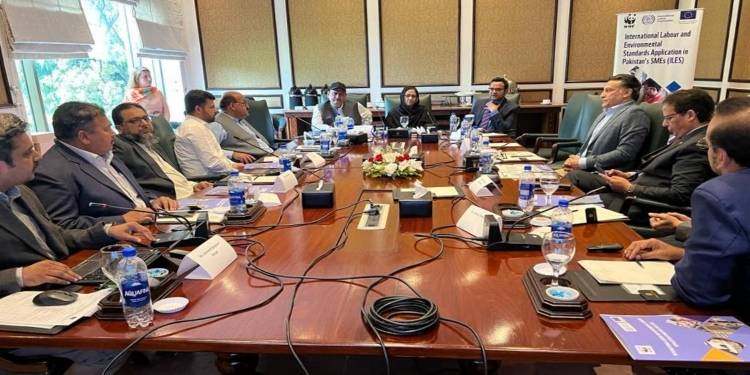
WWF-Pakistan and the International Labour Organization (ILO) conducted a dialogue on improving environmental governance and fostering inter-provincial coordination for improving compliance with Multilateral Environmental Agreements (MEAs) and sustainable development goals (SDGs) across the textile and leather sector.
This initiative is being undertaken as part of the European Union-funded program 'International Labour and Environmental Standards (ILES) Application in Pakistan's SMEs' which aims to foster sustainable and inclusive growth in Pakistan by facilitating its economic integration into the global and regional markets. This will be achieved through the enhancement of compliance with labor and environmental standards, as well as by reinforcing competitiveness.
Speaking on the occasion, Mr. Asif Shaibzada, Director General Ministry of Climate Change, appreciated the European Union for promoting compliance with national and international standards in the textile and leather SMEs of Pakistan through ILES. He said they are looking forward to the EU continuing this support in the coming years in order to promote compliance with the Generalized System of Preferences (GSP) Plus status of Pakistan.
Mr. Sohail Ali Naqvi, Director Freshwater Programme, WWF-Pakistan focused on the relevance of environmental governance in sustaining economic growth and the current status in relation to GSP+ and MEAs. Furthermore, he emphasized the importance of robust environmental governance frameworks and briefed about the provincial initiatives in this regard, ensuring effective implementation, regulations, and the way forward. He stated that the focus of ILES is on implementing sustainable practices and driving positive environmental outcomes in these industries. He also highlighted the need for a reporting mechanism for MEAs and SDGs across provinces to streamline data reporting.
Ms. Farzana Altaf Shah, Director General of, the Pakistan Environmental Protection Agency echoed the need for a unified reporting mechanism for all provinces and emphasized the need for effective coordination between all EPAs for knowledge sharing and capacity development.
The dialogue was attended by director generals of EPA-Punjab, EPA-KPK, Pak-EPA, MoCC, and representatives of GBEPA, SEPA, EPA-AJK, and the Ministry of Commerce.
This initiative is being undertaken as part of the European Union-funded program 'International Labour and Environmental Standards (ILES) Application in Pakistan's SMEs' which aims to foster sustainable and inclusive growth in Pakistan by facilitating its economic integration into the global and regional markets. This will be achieved through the enhancement of compliance with labor and environmental standards, as well as by reinforcing competitiveness.
Speaking on the occasion, Mr. Asif Shaibzada, Director General Ministry of Climate Change, appreciated the European Union for promoting compliance with national and international standards in the textile and leather SMEs of Pakistan through ILES. He said they are looking forward to the EU continuing this support in the coming years in order to promote compliance with the Generalized System of Preferences (GSP) Plus status of Pakistan.
Mr. Sohail Ali Naqvi, Director Freshwater Programme, WWF-Pakistan focused on the relevance of environmental governance in sustaining economic growth and the current status in relation to GSP+ and MEAs. Furthermore, he emphasized the importance of robust environmental governance frameworks and briefed about the provincial initiatives in this regard, ensuring effective implementation, regulations, and the way forward. He stated that the focus of ILES is on implementing sustainable practices and driving positive environmental outcomes in these industries. He also highlighted the need for a reporting mechanism for MEAs and SDGs across provinces to streamline data reporting.
Ms. Farzana Altaf Shah, Director General of, the Pakistan Environmental Protection Agency echoed the need for a unified reporting mechanism for all provinces and emphasized the need for effective coordination between all EPAs for knowledge sharing and capacity development.
The dialogue was attended by director generals of EPA-Punjab, EPA-KPK, Pak-EPA, MoCC, and representatives of GBEPA, SEPA, EPA-AJK, and the Ministry of Commerce.

